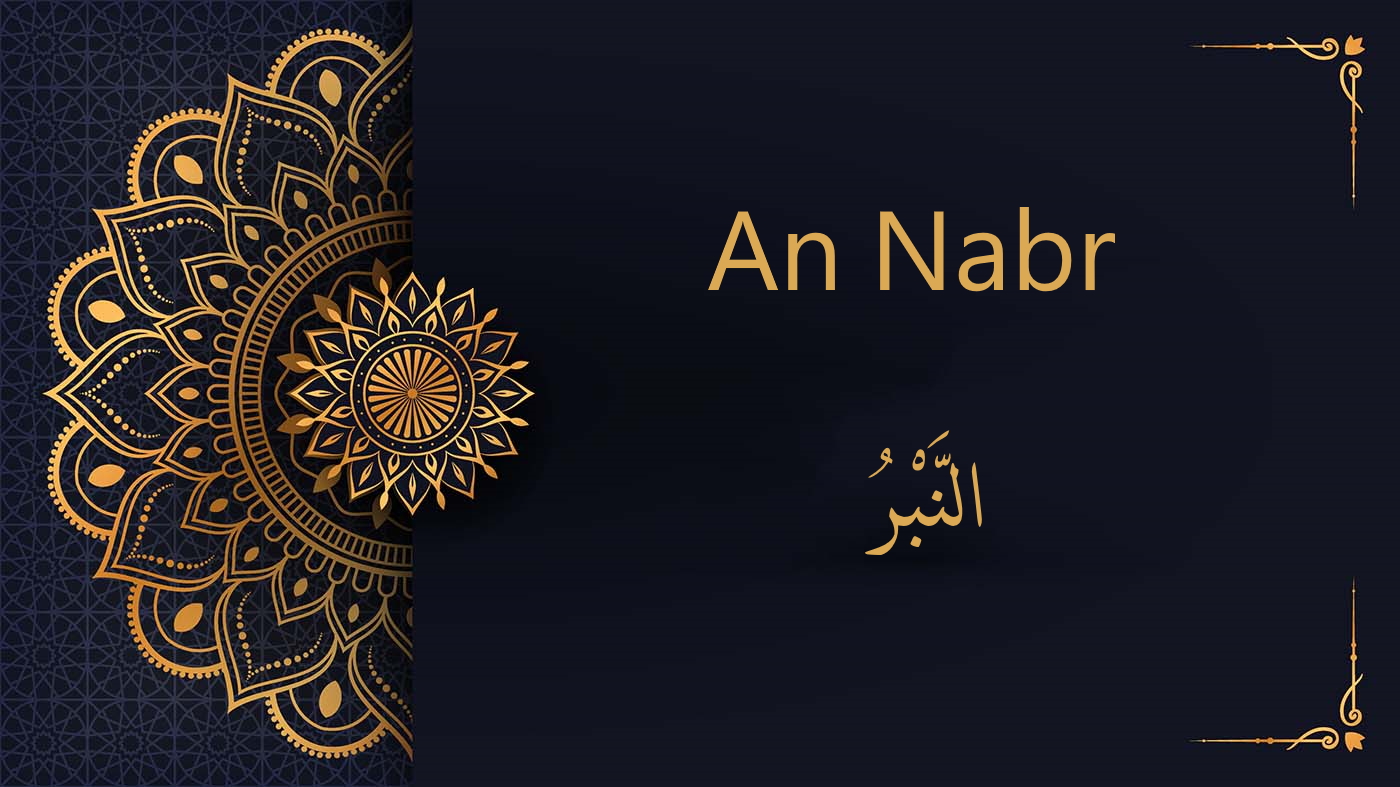
Nabr in Tajweed refers to a subtle elevation of the voice and is identified in five distinct forms, particularly when accompanied by Madd al Lazeem (an elongation followed by a shedda).
A subtle voice elevation occurs when pausing on a word. Scholars implemented this rule to prevent producing a ghunna on the letter that follows the elongation (madd).
Examples:
صِرَاطَ الَّذِينَ أَنْعَمْتَ عَلَيْهِمْ غَيْرِ الْمَغْضُوبِ عَلَيْهِمْ وَلَا الضَّالِّينَ
The path of those upon whom You have bestowed favour, not of those who have evoked [Your] anger or of those who are astray. (1:7)
قُلْ أَتُحَاجُّونَنَا فِي اللَّهِ وَهُوَ رَبُّنَا وَرَبُّكُمْ
Say, [O Muhammad], “Do you argue with us about Allah while He is our Lord and your Lord? (2:139)
الْحَاقَّةُ
The Inevitable Reality – (69:1)
Don’t want to go through the translation anymore?
30 free minutes with your qualified Egyptian teacher.
We employ an nabr to subtly indicate the presence of the hamza (ء) to avoid either exaggerating its pronunciation or omitting it altogether.
Examples:
وَأَنزَلَ مِنَ السَّمَاءِ مَاءً فَأَخْرَجَ بِهِ مِنَ الثَّمَرَاتِ رِزْقًا لَّكُمْ
and sent down from the sky, rain and brought forth thereby fruits as provision for you. (2:22)
قَالَ سَآوِي إِلَىٰ جَبَلٍ يَعْصِمُنِي مِنَ الْمَاءِ
[But] he said, “I will take refuge on a mountain to protect me from the water.” (11:43)
قَالُوا أَنُؤْمِنُ كَمَا آمَنَ السُّفَهَاءُ
” they say, “Should we believe as the foolish have believed?” (2:13)
وَلِيَعْلَمَ اللَّهُ الَّذِينَ آمَنُوا وَيَتَّخِذَ مِنكُمْ شُهَدَاءَ
Allah may make evident those who believe and [may] take to Himself from among you martyrs (3:140)
Examples:
لِّكُلِّ نَبَإٍ مُّسْتَقَرٌّ ۚ
For every happening is a finality; (6:67)
إِلَّا الَّذِينَ آمَنُوا وَعَمِلُوا الصَّالِحَاتِ وَتَوَاصَوْا بِالْحَقِّ وَتَوَاصَوْا بِالصَّبْرِ
Except for those who have believed and done righteous deeds and advised each other to truth and advised each other to patience. (103:3)
يَسْأَلُونَكَ عَنِ الْأَهِلَّةِ ۖ قُلْ هِيَ مَوَاقِيتُ لِلنَّاسِ وَالْحَجِّ
They ask you, [O Muhammad], about the new moons. Say, “They are measurements of time for the people and for Hajj.” (2:189)
تَبَّتْ يَدَا أَبِي لَهَبٍ وَتَبَّ
May the hands of Abu Lahab be ruined, and ruined is he. (111:1)
Examples:
وَأَنزَلَ مِنَ السَّمَاءِ مَاءً فَأَخْرَجَ بِهِ مِنَ الثَّمَرَاتِ رِزْقًا لَّكُمْ
and sent down from the sky, rain and brought forth thereby fruits as provision for you. (2:22)
قَالَ سَآوِي إِلَىٰ جَبَلٍ يَعْصِمُنِي مِنَ الْمَاءِ
[But] he said, “I will take refuge on a mountain to protect me from the water.” (11:43)
قَالُوا أَنُؤْمِنُ كَمَا آمَنَ السُّفَهَاءُ
” they say, “Should we believe as the foolish have believed?” (2:13)
وَلِيَعْلَمَ اللَّهُ الَّذِينَ آمَنُوا وَيَتَّخِذَ مِنكُمْ شُهَدَاءَ
Allah may make evident those who believe and [may] take to Himself from among you martyrs (3:140)
إِيَّاكَ نَعْبُدُ وَإِيَّاكَ نَسْتَعِينُ
It is You we worship and You we ask for help. (1:5)
اللَّهُ وَلِيُّ الَّذِينَ آمَنُوا يُخْرِجُهُم مِّنَ الظُّلُمَاتِ إِلَى النُّورِ
Allah is the ally of those who believe. He brings them out from darknesses into the light. (2:257)
إِنَّ الشَّيْطَانَ لِلْإِنسَانِ عَدُوٌّ مُّبِينٌ
Indeed Satan, to man, is a manifest enemy. (12:5)
When two consecutive sakoons are present, the standard rule requires the omission of the madd (extension). However, to indicate the removal of this alif ا, we use an nabr. This ensures that we avoid a ghunna while retaining the verse’s meaning. It also provides clarity for the listener about the alif’s deletion. Without this distinction, there’s potential for confusion, especially when the same verb is conjugated for the 3rd person.
For instance, when “قَالا” is pronounced without using an nabr, it becomes “قَالَ” which is the 3rd person singular. This shift can alter the verse’s meaning for the listener.
Examples:
حَتَّىٰ أَتَانَا الْيَقِينُ
Until there came to us the certainty.” (74:74)
وَقَالَا الْحَمْدُ لِلَّهِ الَّذِي فَضَّلَنَا عَلَىٰ كَثِيرٍ مِّنْ عِبَادِهِ الْمُؤْمِنِينَ
and they said, “Praise [is due] to Allah, who has favoured us over many of His believing servants.” (27:15)
فَلَمَّا ذَاقَا الشَّجَرَةَ بَدَتْ لَهُمَا سَوْآتُهُمَا
And when they tasted of the tree, their private parts became apparent to them (7:22)
وَاسْتَبَقَا الْبَابَ وَقَدَّتْ قَمِيصَهُ مِن دُبُرٍ وَأَلْفَيَا سَيِّدَهَا لَدَى الْبَابِ
And they both raced to the door, and she tore his shirt from the back, and they found her husband at the door. (12:25)
Congratulations, you have successfully completed all the Tajweed lessons!
At Al-dirassa Institute, we provide an opportunity to further delve into the tajweed rules under the guidance of a qualified teacher. If you wish to continue or seek clarification on any topics, please don’t hesitate to reach out to us.
Discover the experiences of our delighted clients who have thoroughly enjoyed utilizing this standout feature.
Alhamdulillah I‘m very pleased with the arabic and Qur’an lessons I receive from teacher Umm Tasneem and I‘m also content with the al-dirassa administration team who were very quick in answering any questions I had. In a month I progressed a lot and I cannot wait to continue my studies with al-dirassa. May Allah reward everyone at al-dirassa.
Verified review - view original
My Qur’an teacher is fantastic, she teaches me in a loving and kind way where I look forward to the lessons and learn so much. My Arabic teacher is equally as nice and has a lot of patience with me, she has great expertise in the field and I’ve progressed really quickly with her. Thank you Al-dirassa!
Verified review - view original

Al-dirassa Institute offers you a gift to help you begin your journey to being fluent in Arabic and learning the Quran.

Al-dirassa Institute offers you a gift to help you begin your journey to being fluent in Arabic and learning the Quran.